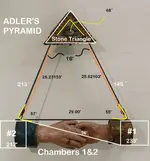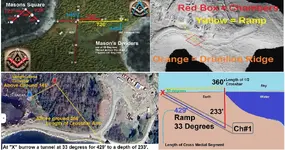SSR
Full Member
- Joined
- Sep 24, 2019
- Messages
- 215
- Reaction score
- 264
- Golden Thread
- 0
- Primary Interest:
- All Treasure Hunting
Nullius in Verba translates to "take no one's word for it". Heed the warning. This is the motto of the British Royal Society (the first Western scientific body). When people allege new fun sounding things that try and make myths real, they are inventing out of need for the detail to market a new and much less improved interpretation of history, and you should run for the exists, because that is not we improve our understanding of anything. There is one career mystery/intrigue writer that I like to finger who has produced in excess of half a dozen books giving us the solution to the OI mystery over 4 decades, each time with a different treasure and more of the same history changing fabrication. The possibility of finding someone who will accept the most recent suggestion without ever diving deeply into it is all that is required for someone to make a living as a writer of this genre.Well since you said so it must be true. But there are like a dozen books that say, No you are wrong. Lets just list 1. Scott Clarke who has written more than one. So now that your imaginary problem is solved whats next?
There is a sort of morality tale attached to OI, for sure. Thales of Miletus was the first Great Sage according to the Greeks. He is the one who is given credit with introducing Geometry to the Greeks from Egypt. Whether or not that is true is unknowable, but it is true that many men, Freemasons included, have taken to repeating this detail. Thales it credited for putting an end to the golden age of myths/ mythological storytelling. His approach was the first truly "scientific" approach. For that he is regarded as the father of empiricism and atomism. He is most famous for his foundational mathematical theorem called Thales theorem (the first mathematical proof). It is found in Euclid's work, Elements, as his 31st proposition. What Morris was doing when he planned at Shoreham/OI is right out of the Freemasonic tradition of honoring Thales. To Freemasons, Pythagoras and Thales are considered brothers (symbolic). The emphasis with geometry is on the reasoned approach to explaining the world and our place in it. For those who turn to OI and try and use religion and myth to account for it there is an accompanying story there to serve them. Those who dig, chase the details they recognize/see as belonging to Enoch's fabled shaft and vault. They smell the Ark. This bit of Hebrew fiction is itself an old morality tale. It came with the warning that those who would dig for it would see the shaft flood when approaching the vault. Attempts to drain the shaft would only ever cause the vault to collapse into the abyss. The contents of Enoch's fabled vault are unattainable, yet we have maroons who still insist that all of this is documented history proven today by mounting ever clever sounding "scientificky" claims that should inspire us to trust myths. It is not to be believed. With Thales you are to break free from the myths and the lure of religious treasures that promise knowledge.
Thales allows us to get our bearings in a very reliable way. As a navigator you should aim to seize the empiric detail. The stone triangle pointer points to N. To find N, this is Thales' method: look to what we call the Big Dipper (he is the credited discoverer of this constellation in Antiquity) and project from the edge of the bowl to the star Polaris. That is your center of certainty in the Universe (for the time being). It all revolves around Polaris and the constance of the Christian cross for those earliest Western scientific minds who gave us the modern scientific age (it was in fact only a revival which followed the error full ways of the Christian age ).
Give Thales a read. He influenced a lot of modern thinking. His "arche", or primal substance was water. In myth that comes from the primordial well which belonged to Enki in the Sumerian myths. Enki was symbolized by the number 40. Water to Thales was a principle in a time before we knew what the elements really were. There is a lot to learn if you are up to not inventing.





